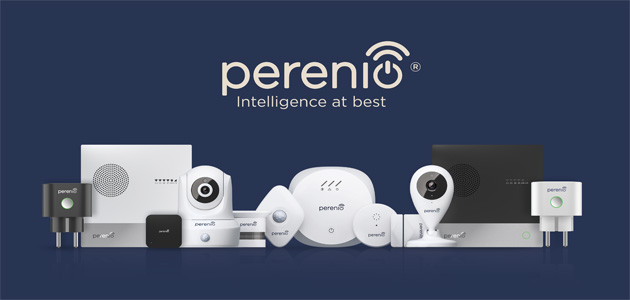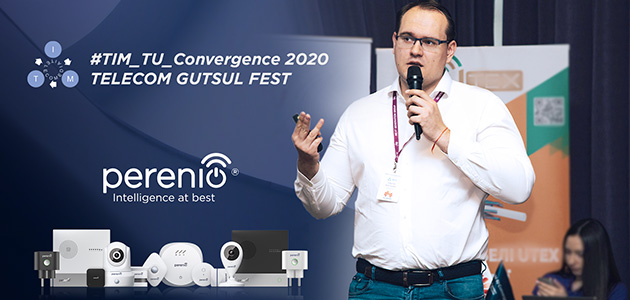Perenio IoT spoke about the benefits of collaboration to mobile operators at #TIM-TU Convergence 2020
#TIM-TU Convergence 2020 was held on March 11-14 in Bukovel (Ukraine) and gathered more than 100 participants from IT and telecom industry. Sergei Kostevich’s speech took place in the section “Prospective directions of the operator business”, where they discussed how to keep subscribers and offer them additional paid services, cases of monetization of IoT solutions and the business component of smart homes and cities.
Perenio IoT presented their flagship product, IoT Router Elegance, to mobile operators. It will add the opportunity to create an inexpensive and easily customizable modular smart home system to the standard telephony and Internet access services. This system will provide security, manage resource consumption and set smart device operation scenarios.
During the presentation, Sergei Kostevich told the audience how IoT Router Elegance replaces several devices. The manufacturer managed to place a large set of functions in a compact stylish case with a non-standard engineering solution. The router supports Bluetooth/ZigBee/Z-Wave protocols and allows remotely control a smart home, it is equipped with a built-in LTE modem and a battery in case of power outages.
In addition, during the report, Sergei Kostevich voiced the following points:
- telecom business is highly competitive, and low ARPU does not allow operators to return the money they invest in network modernization quickly;
- Traditional services, such as the Internet and IPTV, don’t increase revenue from each subscriber, respectively, the operators are faced with the task of finding new sources of profit;
- a flexible hardware and software platform with IoT solutions allows operators to receive a source of new revenue. By adding an IoT router to the Internet and telephony, provider can offer more complete range of services for customer on the ongoing basis;
- usage of IoT technologies allows to create a smart city and fundamentally improve the economy of the city, the standards of living and security of the inhabitants.
Sergeі Kostevich noted: “Today revenue is not so much about the costs, but about quality and amount of the services provided. If an operator offers several services in complex, it can increase profit on the second or third service, because subscribers purchase it precisely because of the benefits of a package offer. An operator has the opportunity not only to earn more, but also to optimize costs. Telecom companies have gained many years of experience in building and operating networks, they are well aware of the intricacies of organizing safe and reliable transmission of information and can potentially offer the most secure, resilient IoT solutions”.

Executive Director of Perenio IoT gave examples of the successful implementation of the Internet of things technologies by mobile operators in his speech.
Singapore's Sing Tel Group (owns telecom operators in 25 countries) has invested in a cloud-based platform for IoT and M2M Jasper applications, which are now used by more than 100 operators around the world. One of the world's largest broadband providers and media giant Comsat has invested in the home planning and design service Houzz, a site that offers more than 40,000 examples of smart homes that contain all kinds of solutions from fire sensors in the fireplace to home theater settings. Etisalat, an operator from the UAE has been consistently seeking and acquiring companies from the Internet of Things through its internal private equity fund. The Deutsche Telekom began experiments in the field of IoT and the smart city long before the emergence of these terms. The company embodies innovations, first of all, in the small town of Friedrichshafen, which has become an experimental platform for DT solutions in the Internet of things.

